情态动词can could may might练习
情态动词复习要点
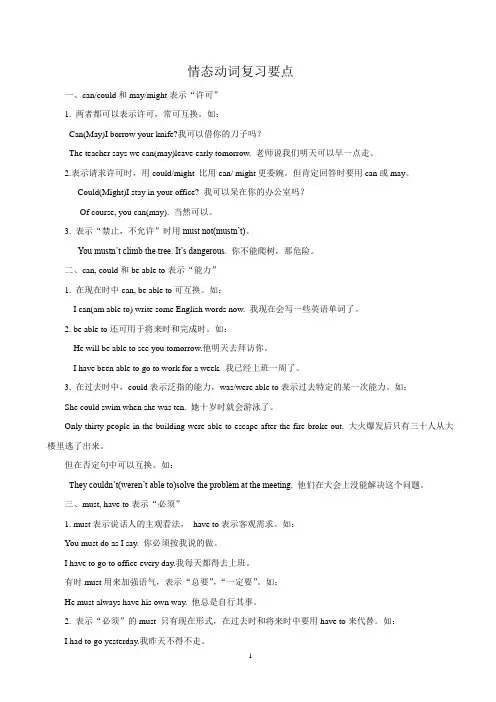
情态动词复习要点一、can/could和may/might表示“许可”1. 两者都可以表示许可,常可互换。
如:Can(May)I borrow your knife?我可以借你的刀子吗?The teacher says we can(may)leave early tomorrow. 老师说我们明天可以早一点走。
2.表示请求许可时,用could/might 比用can/ might更委婉。
但肯定回答时要用can或may。
---Could(Might)I stay in your office? 我可以呆在你的办公室吗?--- Of course, you can(may). 当然可以。
3. 表示“禁止,不允许”时用must not(mustn’t)。
You mustn’t climb the tree. It’s dangerous. 你不能爬树,那危险。
二、can, could和be able to表示“能力”1. 在现在时中can, be able to可互换。
如:I can(am able to) write some English words now. 我现在会写一些英语单词了。
2. be able to还可用于将来时和完成时。
如:He will be able to see you tomorrow.他明天去拜访你。
I have been able to go to work for a week. 我已经上班一周了。
3. 在过去时中,could表示泛指的能力,was/were able to表示过去特定的某一次能力。
如:She could swim when she was ten. 她十岁时就会游泳了。
Only thirty people in the building were able to escape after the fire broke out. 大火爆发后只有三十人从大楼里逃了出来。
情态动词must,can,could,may,might表推测的用法
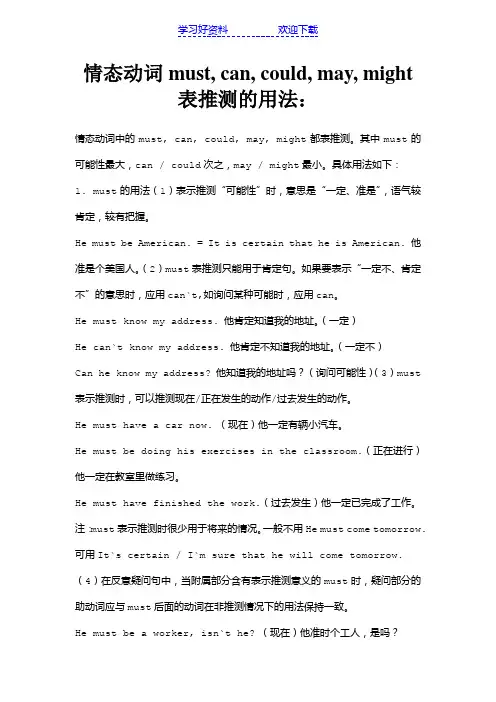
情态动词must, can, could, may, might表推测的用法:情态动词中的must, can, could, may, might都表推测。
其中must的可能性最大,can / could次之,may / might最小。
具体用法如下:1. must的用法(1)表示推测“可能性”时,意思是“一定、准是”,语气较肯定,较有把握。
He must be American. = It is certain that he is American. 他准是个美国人。
(2)must表推测只能用于肯定句。
如果要表示“一定不、肯定不”的意思时,应用can`t,如询问某种可能时,应用can。
He must know my address. 他肯定知道我的地址。
(一定)He can`t know my address. 他肯定不知道我的地址。
(一定不)Can he know my address? 他知道我的地址吗?(询问可能性)(3)must 表示推测时,可以推测现在/正在发生的动作/过去发生的动作。
He must have a car now. (现在)他一定有辆小汽车。
He must be doing his exercises in the classroom.(正在进行)他一定在教室里做练习。
He must have finished the work.(过去发生)他一定已完成了工作。
注:must表示推测时很少用于将来的情况。
一般不用He must come tomorrow.可用It`s certain / I`m sure that he will come tomorrow. (4)在反意疑问句中,当附属部分含有表示推测意义的must时,疑问部分的助动词应与must后面的动词在非推测情况下的用法保持一致。
He must be a worker, isn`t he? (现在)他准时个工人,是吗?It must have rained last night, didn`t it? (过去)昨晚一定下雨了,是不是?You must have learned English for many years, haven`t you? (完成时)你一定学了好多年英语,是吗?2. can / could的用法(1)can表示推测“可能性”时,往往用于否定句或疑问句。
(完整版)情态动词用法及其练习与答案

情态动词情态动词有can (could), may (might), must, have to, shall (should, will (would), dare (dared), need (needed), ought to等。
情态动词无人称和数的变化;不能单独使用,必须与其后的动词原形构成谓语。
一、can, could1) 表示能力(体力、知识、技能)。
如:Can you lift this heavy box? (体力)Mary can speak three languages.(知识)Can you skate?(技能)此时可用be able to代替。
Can只有一般现在式和一般过去式;而be able to则有更多的时态。
如:I’ll not be able to come this afternoon.当表示“经过努力才得以做成功某事”时应用be able to,不能用Can。
如:He was able to go to the party yesterday evening in spite of the heavy rain.2) 表示请求和允许。
-----Can I go now?----- Yes, you can. / No, you can’t.此时可与may互换。
在疑问句中还可用could, might代替,不是过去式,只是语气更委婉,不能用于肯定句和答语中。
---- Could I come to see you tomorrow?---- Yes, you can. ( No, I’m afraid not. )3) 表示客观可能性(客观原因形成的能力)。
They’ve changed the ti metable, so we can go by bus instead.This hall can hold 500 people at least.4) 表示推测(惊讶、怀疑、不相信的态度),用于疑问句、否定句和感叹句中。
【英语语法】情态动词can的用法(附练习及答案)
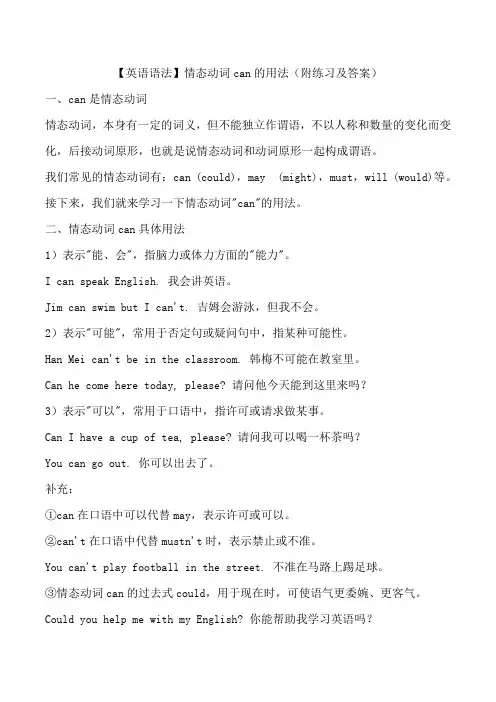
【英语语法】情态动词can的用法(附练习及答案)一、can是情态动词情态动词,本身有一定的词义,但不能独立作谓语,不以人称和数量的变化而变化,后接动词原形,也就是说情态动词和动词原形一起构成谓语。
我们常见的情态动词有:can (could),may (might),must,will (would)等。
接下来,我们就来学习一下情态动词"can"的用法。
二、情态动词can具体用法1)表示"能、会",指脑力或体力方面的"能力"。
I can speak English. 我会讲英语。
Jim can swim but I can't. 吉姆会游泳,但我不会。
2)表示"可能",常用于否定句或疑问句中,指某种可能性。
Han Mei can't be in the classroom. 韩梅不可能在教室里。
Can he come here today, please? 请问他今天能到这里来吗?3)表示"可以",常用于口语中,指许可或请求做某事。
Can I have a cup of tea, please? 请问我可以喝一杯茶吗?You can go out. 你可以出去了。
补充:①can在口语中可以代替may,表示许可或可以。
②can't在口语中代替mustn't时,表示禁止或不准。
You can't play football in the street. 不准在马路上踢足球。
③情态动词can的过去式could,用于现在时,可使语气更委婉、更客气。
Could you help me with my English? 你能帮助我学习英语吗?三、情态动词can的基本句型1)肯定句型为:主语+can+动词原形+其它。
They can play basketball. 他们能打篮球。
情态动词表推测的讲解及练习题
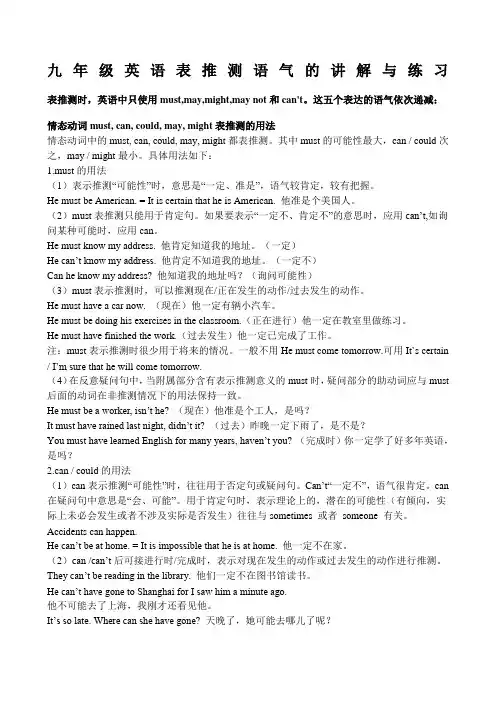
九年级英语表推测语气的讲解与练习表推测时,英语中只使用must,may,might,may not和can't。
这五个表达的语气依次递减:情态动词must, can, could, may, might表推测的用法情态动词中的must, can, could, may, might都表推测。
其中must的可能性最大,can / could次之,may / might最小。
具体用法如下:1.must的用法(1)表示推测“可能性”时,意思是“一定、准是”,语气较肯定,较有把握。
He must be American. = It is certain that he is American. 他准是个美国人。
(2)must表推测只能用于肯定句。
如果要表示“一定不、肯定不”的意思时,应用can’t,如询问某种可能时,应用can。
He must know my address. 他肯定知道我的地址。
(一定)He can’t know my address. 他肯定不知道我的地址。
(一定不)Can he know my address? 他知道我的地址吗?(询问可能性)(3)must表示推测时,可以推测现在/正在发生的动作/过去发生的动作。
He must have a car now. (现在)他一定有辆小汽车。
He must be doing his exercises in the classroom.(正在进行)他一定在教室里做练习。
He must have finished the work.(过去发生)他一定已完成了工作。
注:must表示推测时很少用于将来的情况。
一般不用He must come tomorrow.可用It`s certain / I’m sure that he will come tomorrow.(4)在反意疑问句中,当附属部分含有表示推测意义的must时,疑问部分的助动词应与must 后面的动词在非推测情况下的用法保持一致。
情态动词练习题(含答案)1
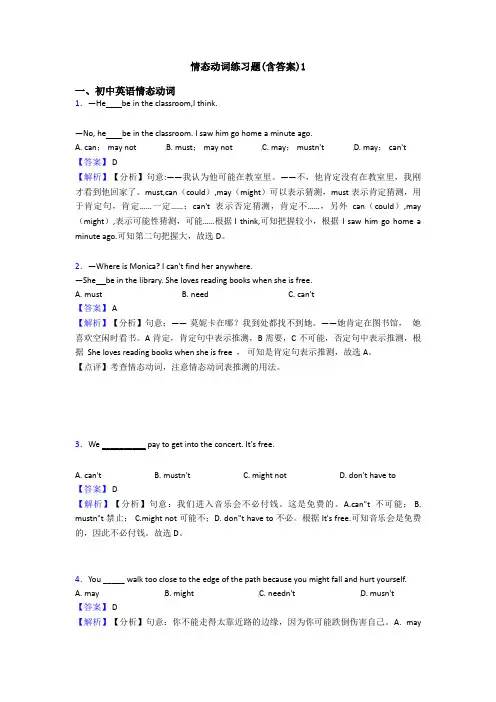
情态动词练习题(含答案)1一、初中英语情态动词1.—He be in the classroom,I think.—No, he be in the classroom. I saw him go home a minute ago.A. can; may notB. must; may notC. may; mustn'tD. may; can't【答案】 D【解析】【分析】句意:——我认为他可能在教室里。
——不,他肯定没有在教室里,我刚才看到他回家了。
must,can(could),may(might)可以表示猜测,must表示肯定猜测,用于肯定句,肯定……一定……;can't表示否定猜测,肯定不……,另外can(could),may (might),表示可能性猜测,可能……根据I think,可知把握较小,根据I saw him go home a minute ago.可知第二句把握大,故选D。
2.—Where is Monica? I can't find her anywhere.—She be in the library. She loves reading books when she is free.A. mustB. needC. can't【答案】 A【解析】【分析】句意:——莫妮卡在哪?我到处都找不到她。
——她肯定在图书馆,她喜欢空闲时看书。
A肯定,肯定句中表示推测,B需要,C不可能,否定句中表示推测,根据 She loves reading books when she is free ,可知是肯定句表示推测,故选A。
【点评】考查情态动词,注意情态动词表推测的用法。
3.We __________ pay to get into the concert. It's free.A. can'tB. mustn'tC. might notD. don't have to【答案】 D【解析】【分析】句意:我们进入音乐会不必付钱。
情态动词can (could), may (might) 等的用法
情态动词有can (could), may (might), must, have to, shall (should, will (would), dare (dared), need (needed), ought to等。
情态动词无人称和数的变化;不能单独使用,必须与其后的动词原形构成谓语一、can, could1) 表示能力(体力、知识、技能)。
Can you lift this heavy box?(体力)Mary can speak three languages.(知识)Can you skate?(技能)此时可用be able to代替。
Can只有一般现在时和一般过去式;而be able to则有更多的时态。
I’ll not be able to come this afternoon.当表示“经过努力才得以做成功某事”时应用be able to,不能用Can。
如:He was able to go to the party yesterday evening in spite of the heavy rain.2) 表示请求和允许。
-----Can I go now?----- Yes, you can. / No, you can’t.此时可与may互换。
在疑问句中还可用could,might代替,不是过去式,只是语气更委婉,不能用于肯定句和答语中。
---- Could I come to see you tomorrow?---- Yes, you can. ( No, I’m afraid not. )3) 表示客观可能性(客观原因形成的能力)。
They’ve changed the timetable, so we can go by bus instead.This hall can hold 500 people at least.4) 表示推测(惊讶、怀疑、不相信的态度),用于疑问句、否定句和感叹句中。
情态动词(讲义及答案)
情态动词(讲义)一、can, could, may, might 表示请求许可1.区别Can I take the book awayCould I take the book awayMay I take the book awayMight I take the book away语气的委婉程度从高到低为 can, could, may, might。
2.can, could, may, might 表示请求许可时的回答。
—Can you give me another chance—Yes, I can. No, I can’t.—Could I look at your pictures—Yes, of course you ./—I am sorry you .#用c ould 提问,表示“能……吗”,若表示同意用 can,不同意用c an ’t,注意不用 could 来回答。
—May I speak to you for a moment in private, pleaseMay 表示请求许可时,常常与第一人称 I 连用,构成“May I…”句式,表示“我可以……吗”肯定回答用 Yes, you may. / Yes, please. / Yes, of course.否定回答用N o, you can’t. / No, you mustn’t. ( )—May I smoke here—, you . It can be dangerous.A.Yes; canB. No; can’tC. Yes; mayD. No; needn’tMight I come inMight I borrow some moneymight 用于礼貌的询问是否能做某事,常出现在口语中,用法稍显过时。
肯定回答通常用 may,否定回答可以用 can’t 或者 mustn’t。
练习:~( )—Can I get you a drink—. I am not thirsty.A.That’s very nice of youB. No, you don’t have toC. Yes, pleaseD. With pleasure ( )—May I leave the classroom now 1—No, you . You shouldn’t le ave until the bell rings.A. may notB. can’tC. needn’tD. couldn’t( )—you pass me a pen I’d like to write down the telephone number.A. NeedB. CouldC. MustD. Should ( )—Could I use your eraser for a while—Yes, of course you .A. couldB. willC. canD. should二、情态动词和短语情态动词1.情态动词needThe little girl needs to get some sleep.I needed two more days to finish thework. Do you need to have some coffeeneed 作实义动词,有人称,时态的变化。
情态动词专项练习题及答案
情态动词专项练习题及答案一、初中英语情态动词1.— I take the magazine out of the reading room?— I'm sorry you .A. Could; couldn'tB. Must; couldn'tC. Will; can'tD. May; can't【答案】 D【解析】【分析】句意:——我可以把杂志带出阅览室吗?——对不起,你不能。
could 能,可以;must必须;will将;may可以;can能,可以,can't不可以,不能。
此处表示请求许可,用could或者may,由could或者may构成的一般疑问句,肯定回答用yes,主语+can,否定回答用sorry,主语+can't,结合选项,故答案选D。
【点评】考查情态动词的辨析。
注意理解句意,理解选项,根据语境,选出正确的答案。
2.— Shall I book some seats for the concert?—______. I've done that.A. Yes, you mayB. No, you mustn'tC. No, you needn'tD. No, you can't【答案】C【解析】【分析】Yes, you may是的,你可以;No, you mustn't 不,你千万不要;No, you needn't不,你不必;No, you can't不,你不能。
句意:我要预定一些音乐会的座位吗?根据下文,我已经办了。
可知选C最符合语境。
【点评】考查交际用语3.— _________ I take my cousin Shirley with us, Mr. Wu?— Yes, but we'll get there by bike. ____________ she ride a bike?— Yes, and she ___________ ride a bike when she was only six years old.A. Could; can; couldB. Can; can; canC. Can; could; couldD. Could; could; can【答案】 A【解析】【分析】句意:-我能带我表弟雪莉和我们一起吗,吴先生?-是的,但我们将骑自行车去那儿。
用may,can,must提问的问句,肯定否定回答分别是什么
用may,can,must提问的问句,肯定否定回答分别是什么用may,can,must提问的问句,肯定否定回答分别是什么情态动词有can (could), may (might), must, have to, shall (should, will (would), dare (dared), need (needed), ought to等。
情态动词无人称和数的变化;不能单独使用,必须与其后的动词原形构成谓语一、 can, could1) 表示能力(体力、知识、技能)。
Can you lift this heavy box?(体力)Mary can speak three languages.(知识)Can you skate?(技能)此时可用be able to代替。
Can只有一般现在时和一般过去式;而be able to则有更多的时态。
I’ll not be able to come this afternoon.当表示“经过努力才得以做成功某事”时应用be able to,不能用Can。
如:He was able to go to the party yesterday evening in spite of the heavy rain.2) 表示请求和允许。
-----Can I go now?----- Yes, you can. / No, you can’t.此时可与may互换。
在疑问句中还可用could,might代替,不是过去式,只是语气更委婉,不能用于肯定句和答语中。
---- Could I come to see you tomorrow?---- Yes, you can. ( No, I’m afraid not. )3) 表示客观可能性(客观原因形成的能力)。
They’ve changed the timetable, so we can go by bus instead.This hall can hold 500 people at least.4) 表示推测(惊讶、怀疑、不相信的态度),用于疑问句、否定句和感叹句中。
- 1、下载文档前请自行甄别文档内容的完整性,平台不提供额外的编辑、内容补充、找答案等附加服务。
- 2、"仅部分预览"的文档,不可在线预览部分如存在完整性等问题,可反馈申请退款(可完整预览的文档不适用该条件!)。
- 3、如文档侵犯您的权益,请联系客服反馈,我们会尽快为您处理(人工客服工作时间:9:00-18:30)。
can在肯定句中表示“有时候会” 注 指一种客观的可能性.常用来说明人或事物特征
• 1.Accident can happen on such rainy days. •2.Even experienced teachers can make mistakes. 3.Children can be naughty.
(3) may + 主语+ 动词原形 “祝某人/ 物…”不用might May you succeed in the coming exam! May our friendship last forever! 祝您美梦成真。 May all your dreams come true. 祝您的生活美满幸福。 May you live a happy life.
• 1.----Is Jack on duty today? ----It __ be him. It’s his turn tomorrow. A. mustn’t B. won’t C. can’t D. needn’t • 2. Well, he __ have gone far– his coat is still here. A. shouldn’t B. mustn’t C. can’t D. wouldn’t
• 3. Who______ it be at this time of day? • A can B may •4.He is very busy. He______ be watching TV at home. A may not B can’t
• 5.The climate of the south_____ be rather cold in winter. • A would B can C must
• 3. ---Mr. Brown is on time for everything .How can he be so late for the important meeting? • Can 表示“惊讶,怀疑,不相信” 的态度(否定句和疑问句)
• 4.1) Can (可能) the news be true? _____ • ---- It ______ be true.(不可能) Can’t 2) He could (may\might) (可能) be _______________ on his way home now. • Can 表示猜测的“可能”,用于 否定句 疑问句 _______ ______, “could”用于 比 Can 弱 肯定句 否定句 疑问句 ______,_____,_____(语气_______)
may not have done这是情态动词的完成时态,表 示“可能没有完成
Can/Could • 2. ----__________ I use your bicycle? • ---- Of course, you_______. can • ----No ,you _______ can’t
口语中can, could表示“许可”, could 的语气比 can委婉,但答语中不用 could而用 can.
可能性
• 4)-- Why hasn’t Jack come back yet?____ anything have happened to him? ---- I am not sure , but I guess something ________ happened. A May; must have B Can; might have
• may \ might • 1)表示许可或征询对方许可 May \Might • ---_________ I use your telephone? may • --- Yes , you ______. • --- No , you _______. mustn’t
• 2) 表 推测 “可能”,用于肯定句和否定句
• 1) He may\ might ____________ (可能) come today, but I’m not sure. • 2) This may not __________ be done by him.(可能不) • 3) I thought you _____ like something to read, so I bought some books for you. 只有宾语从句中 • A. may B might might表过去的
1.
can和could
Many of us can use the computer now, but we couldn’t ten years ago. * 能力 (1)表“_____”,指现在和将来用___ can could 指过去用_____.
• 1. The baby will ____ walk in a few months. • A can B could C be able to • 2. The fire spread very quickly, but luckily everyone ______ get out. A. had to B would C. could D. was able to
6.---- ____I use your bicycle? ---- Of course, you____.
A. Can ;could B Could ; can
• 7. He said that I _____use the phone. • A may B might • 8. The man looks energetic, so he _____ be ill. A may not B can’t
• The World Wide Web is sometimes jokingly called the World Wide Wait because it __ be very slow. A. should B. must C. will D. can
• We _____ go to the cinema tonight, but we are not sure. • A. can B may C must
can 表示一个人长期的能力,be able to是表示一个较短暂的过程
• can 和be able to 都可以表示 能力.can泛指一般的能力,而且 只有两种形式,即:can, could.be able to 则主要指具 体做到了某件事的能力,其形 式主要是靠be 发生变化,所以 形式比can 多
Notice: may / might not 可能不(语气不肯定) can / could not 不可能(语气肯定) 1. He may not be ill. 他可能没病。 2. He can not be ill. 他不可能有病。
9.Helen ___ go on the trip with us, but she isn’t quite sure yet. A. Shall B. must C. may D. can 10.We ___ have proved great adventurers, but we have done the greatest march ever made in the past ten years. A. needn’t B. may not C. shouldn’t D. mustn’t
情态动词
1.Exercising alone can be boring.
2.I don’t know where she is, she may be in Wuhan. 3.You mighe could have a cup of coffee.
